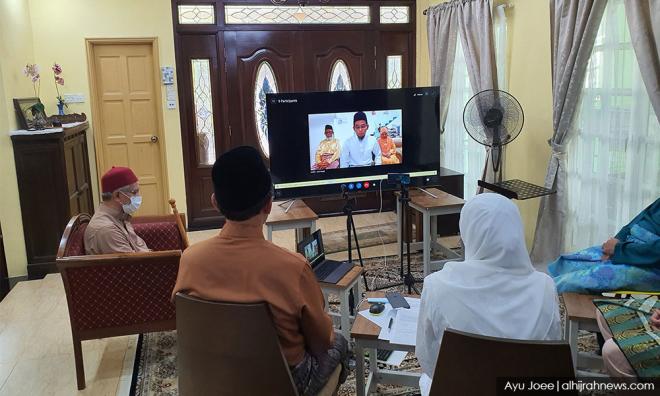
Muhammad Don Haadi Don Putra and Nahdatul Aishah Mohd Shariff have stolen the limelight over the past few days after becoming the first couple in the country to tie the knot via video conferencing recently.
As many couples are forced to postpone their nuptials following the movement control order implementation, the online solemnisation ceremony organised by the Federal Territories Islamic Religious Department (Jawi) last Saturday has somehow provided a “solution” for those who have to put their wedding plans on hold.
Although it might seem simple, online solemnisation actually requires those involved to strictly follow standard operating procedures that have been set, Jawi director Mohd Ajib Ismail told Bernama.
He said to date, Jawi had received online solemnisation applications from about 20 couples and the number is expected to increase in the future.
However, Ajib said only couples that had obtained the marriage approval from Jawi before the MCO was enforced were allowed to send in their applications.
“Couples who have obtained the marriage approval (before the MCO implementation) must fill up a form and submit it to us.
“The applications will then be screened by the Jawi marriage and family development division chief assistant director,” he said.
Ajib said as the solemnisation would be entirely conducted online, there were several key aspects to consider including high-speed internet access and stable connection that enable those involved to use any online video conferencing platforms such as Skype without interruptions.
“The ijab and kabul (offer and acceptance) process will be considered void if there are interruptions and we have to repeat it,” he said.
Ajib added that prior to the ceremony, it was important for the jurunikah (person in-charge of solemnising the marriage) or imam to ensure that all involved including the bride, the groom and the wali (the person responsible for the bride) are the rightful persons.
He added that the imam must also communicate with the parties involved two or three days before the ceremony.
A rehearsal session would also be held to ensure that all parties were prepared with each ceremony taking approximately 15 minutes, he added.
Ajib said the online solemnisation would involve people from three different locations namely the groom; the bride who would be accompanied by the wali and two witnesses and the jurunikah or imam or registrar of marriage, divorce and revocation.
“There will also be a Jawi official tasked with checking on the preparations at the bride’s house to ensure SOP compliance,” he added.
Although there are lingering doubts about the method, Ajib said online solemnisation was in line with the decision of the 97th Muzakarah (discussion) Committee of the National Council for Islamic Religious Affairs (MKI) meeting held in 2011 which decided that it should be solemnised by means of video conferencing.
He said after the MCO period is over, couples who had been solemnised via video conferencing need not go through the akad nikah ceremony again.
He noted that once the MCO is over, the solemnisation ceremony could be held as usual.
Don Haadi, 29, when contacted by Bernama said he and his wife were supposed to get married on April 14 but it was postponed due to the MCO.
Although their wedding ceremony did not go as planned, the 29-year-old civil servant was grateful that everything went well for him and his wife.
On the reaction he received over his decision to hold his solemnisation online and in just a simple ceremony, Don Haadi said it was well accepted by families from both sides.
He also lauded the decision by MKI that allowed the ceremony to be conducted online during the MCO period, describing it as such an ease for all parties especially the bride and groom.
“For couples who have obtained the marriage approval (before the MCO implementation) but could not continue with their wedding plans, I advise them to refer to religious departments in their respective states,” he said.
- Bernama


No comments:
Post a Comment
Note: Only a member of this blog may post a comment.